![]()
The Words of the Robinson Family
|
|
The Words of the Robinson Family |
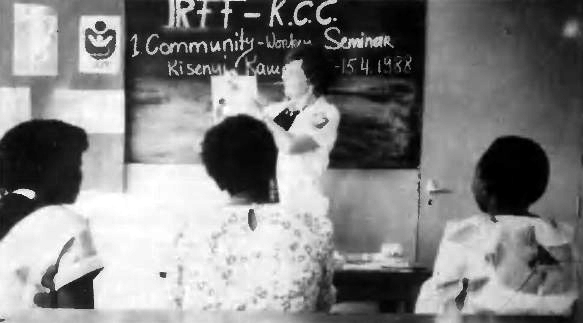
Mrs.
Ruth Robinson teaches her staff how to convey principles of health
care through simple diagrams and pictures.
Uganda, located in East Africa, is surrounded by the countries of Sudan, Zaire, Rwanda, Tanzania, and Kenya. Some 28 tribal groups exist in Uganda, although the major ethnic groups are the pastoral Nilotic tribes of the north and the agricultural Bantu tribes of the south. Ninety-one percent of the 15,300,000 people live in rural areas. Despite a difficult economic situation, the fertile soil of Uganda enables people to survive by supporting themselves and their families from the land.
Kampala is the commercial and administrative capital. The Kampala City Council includes a City Health Department which, in conjunction with the federal Ministry of Health, is responsible for health services in the city.
Years of political instability and economic decline have led to the deterioration of a health system that was once generally thought to be better than most in the continent. Hospitals have deteriorated physically, equipment and drugs are scarce, and skilled manpower has left the country. Tropical diseases such as sleeping sickness and malaria, which had been previously controlled, have become endemic. There is a well-established network of facilities including dispensaries, health-care centers, and rural or district hospitals, which could be rehabilitated if given sufficient funds.
IRFF in Uganda has taken up the responsibility of renovating eight city clinics. One of those facilities, the Kinsenyi clinic, is located in the biggest slum area of Kampala.
Having been almost demolished during the recent war, this clinic has now been renovated and staffed by professionals once again.
IRFF centers in the United States, Germany, and Italy have been generous in their support of this and other clinics in the city by regularly sending us drugs and medical equipment.
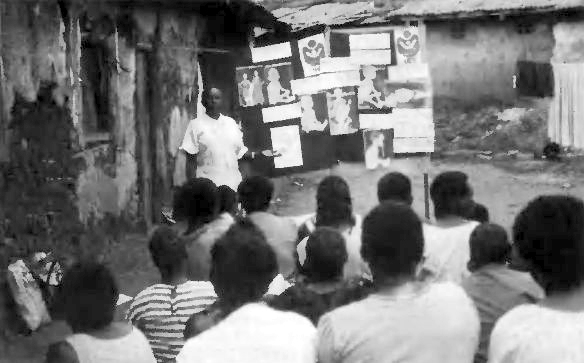
An
IRFF volunteer gives a lecture on health care to the people of the
community.
For two years I had been responsible for the IRFF Mobile Immunization program in the Ivory Coast. When one of our native church members successfully took over the responsibility for this ongoing project, my desire was once more to volunteer to work in a foreign country. Then, upon coming to Uganda for my new mission, I quickly had to prepare my heart to undergo a "spiritual operation."
Heung Jin Nim had already set the pattern for the second selves and chosen ones in this country, and the spirit of "moving forward" was clearly expressed by the members here. Coming to Uganda was one of the greatest tests in my life of faith. In the beginning I understood so little of Heung Jin Nim's guidance, and my heart was tremendously challenged in taking up this new vision, as expressed by our central figure in Uganda.
After three months of research into the social and medical needs of the area, the direction Heavenly Father wanted me to take became very clear: setting up a community-based health education program in a slum area of Kampala near the renovated Kinsenyi clinic. Even though several other relief organizations with much longer experience in this country warned me not to take up such a tremendous challenge, I felt I had to do it. Haven't our True Parents educated us to be willing to work under the most difficult circumstances?
Every big city in the world has, of course, its own section of poor. Slum areas in Africa are not so much different from those in Thailand, Bolivia, or New York. Uganda, once known as "The Pearl of Africa," has suffered tremendous hardship over the past 25 years since it became independent from Britain. Today, in its second year of relative political stability, much needs to be done to give internal and external hope to its people, especially to the younger generation.
With the help of the City Health Department, we chose an area that served about 3,000 people. In 1985 and 1986, heavy fighting had taken place in this section of the city in the wake of a military coup. Many people had died. Murders, rapes, and robberies had taken place daily. The survivors -- discouraged, hopeless, penniless, uneducated, old and young -- were soon to become my many friends.
In April 1988 I started a socio-medical project, selecting local volunteers to be my students and assistants. They received a one-week orientation and training seminar. Our objectives for this project were based on a previously done survey of the needs of the area and were as follows:
1. Encourage primary health care through:
a. home visits
b. group education in the community c) training local people to become health educators
2. Build one toilet per month as a community self-help project.
Home visiting was done three times a week for the purpose of locating social or medical problems in children under five.
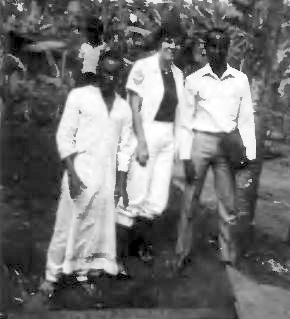
Mrs.
Ruth Robinson oversees the construction of new sanitary facilities.
In two months we were able to visit 81 families and examine 143 children. On several occasions I was horrified to see families actually living with their animals. Animals would be sharing people's huts or people would be living in animals' stables. I saw chickens and goats eating from the same plate of food as a 10-month-old infant. One day I saw the door of a hut half open, and as no one answered my call, I entered and found a tiny infant on the floor tied by a rope to some furniture. The baby was highly anemic and malnourished. I could not rest until, together with my volunteers, we located the father in the village. His wife had run away a few months before, leaving him with the baby. We informed the Kampala Social Welfare Center, and the child was moved from his home to a children's hospital for care.
We could see that health education was badly needed in our small area. Six out of 10 families had experienced the death of an infant due to diarrhea, malaria, neonatal tetanus, or measles. All of these diseases could have been prevented if the mothers had been educated adequately in basic health care.
It took me a full month to accept the reality of the appalling circumstances under which these people were living. Many times I came home to our church center and was unable to express my internal feelings to brothers and sisters. It hurt me to realize that the people we were trying to serve were Heavenly Father's precious children and our very own brothers and sisters too. In my prayers I could grasp how much more I had to develop an unconditional heart of giving.
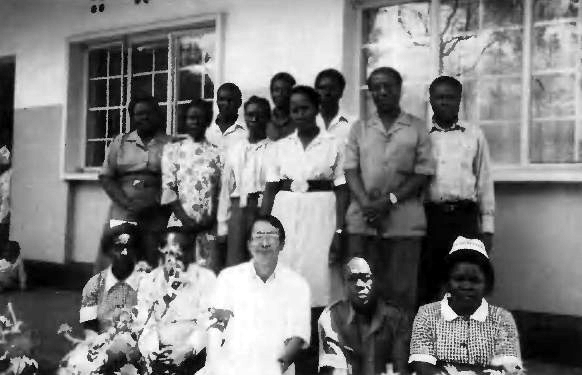
The
medical staff at the renovated Kisenyi Clinic in Kampala.
Malnutrition is very prevalent here, as in other developing countries. We taught mothers how to prepare baby food in order to ease the difficult transition from breast milk to solid food. Mothers learned the necessity of immunization, the importance of a balanced healthy diet, how to prevent contamination that causes worms, and how to prepare the special sugar/salt drink that is used as a life-saving therapy for children with dehydration syndrome.
In our medical training for the volunteers, we included two hours of social studies a week. The Principle view was taught in such topics as: The Principles of Education, Moral and Ethical Behavior in Society, and Human Responsibility. Especially at this time in Uganda everybody speaks about the rehabilitation of the country, so the students could easily realize the necessity of "internal" restoration in relationship to the country's external restoration.
Our work is still very small, and our accomplishments seem like a drop of water in a big ocean. Yet I feel deeply that Heavenly Father and True Parents have been guiding us. In teaching primary health care I am able to express at least a little of God's heart, and I hope that through our activities, people may understand more and more that it is always our own personal responsibility to change a bad situation into a better one.
People around us have begun to wonder what the secret of our accomplishment is. The answer came out during an official primary health care seminar sponsored by the Ugandan Red Cross. Our students were asked, "How much does IRFF pay you for your work?" They replied, "Nothing!" "Why do you work for free?" they were asked. "Because our teachers love our community and us, and we're working together to make it a beautiful environment."
In the seven months I have been in Uganda, I have once again realized the importance of being open for any kind of mission. I never imagined that I would be teaching primary health care in a slum! I learned that if we do not define ourselves by our limitations, God always has a way to educate and guide us on the spot.
I want to express my deepest appreciation to all my brothers and sisters here -- second selves and chosen ones -- for their deep, loving support in all of our activities. I pray that together we may be determined to work hard in order to make the country of Uganda once again "The Pearl of Africa," centered on God's love, will, and truth.
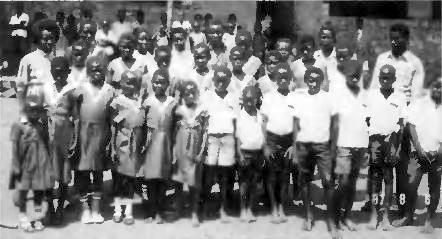
The
children stand proudly in front of their school.
Another IRFF project in Uganda is a primary school that is currently offering 450 children the opportunity for a brighter future. The school sits on an 80-acre plot of land in the village of Kiwoza, located near Bugerere, about 80 miles north of Kampala. The land was donated to our church by Mr. Obadia Sajjabi, a local man; thus the school is called the Obadia Sajjabi Community School. It was registered in February 1986 as a private educational institute under the auspices of the Unification Church of Uganda. The main objectives of the school are:
1. To offer primary education in a rural area as a service to the nation and people of Uganda.
2. To improve the educational system by guiding children to be responsible as early as possible to live a Principle lifestyle.
3. To lay a foundation for a proposed polytechnic school.
Presently we teach grades one through seven; most of the children are in the lower grades. The school serves not only the immediate village of Kiwoza but many surrounding districts as well. Eight teachers, including a headmaster, are responsible for the smooth functioning of the school. Most of the teachers have attended a 2-day or 7-day Principle workshop. Of the two teachers who are our church members, one is responsible for religious education and the other teaches several different subjects. Pupils pay some money as a school fee and from this we pay the teachers an allowance.
Beautiful school uniforms were made and donated by one of our church members. Boys wear blue shorts and white shirts, and girls wear blue dresses with white collars. Parents participate in the affairs of the school through a Parent/Teacher Association. The school promotes a very good image of our church and of IRFF to the community, and through it we can reach out to all the people of the area.
Although we have buildings for seven grades, a staff room, and a headmaster's office, these buildings are not yet fully completed, and the older ones need renovation urgently. Some pupils are sitting on the floors because of a lack of school desks. Our immediate goals are to renovate the old buildings and provide desks for the children. We also have plans to construct a room that can be used as a first-aid post and a dispensary so that the pupils and the people of the community will no longer have to walk many miles in order to reach the nearest dispensary.